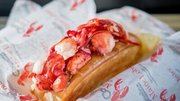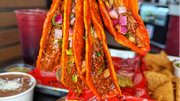Commentary
Food trucks are now the ‘premiumization’ of foodservice – are you on board?
Food trucks have evolved from a utilitarian purpose many years ago to become the channel that is the bridge between the desirability of the luxury world and the function and necessity of the mass market.

April 7, 2017
By Paul Schlossberg
 |
Paul Schlossberg operates DFW Consulting and is a long time food and beverage marketing consultant. |
You might not be familiar with the word, "premiumization." But if you've been operating a food truck for a while, the odds are you're already reasonably successful with it. What you're doing with your food truck business is probably a good example of premiumization.
There's a quote from the legendary country singer Loretta Lynn. It applies here. "You either have to be first, best or different."
Do you remember the term, mobile catering? Maybe you recall the derogatory description,"roach coach?"
These were food trucks serving construction sites and workplaces where there were not enough people to justify a bank of vending machines. Most of what they sold was packaged. Food was kept hot through a variety of hot cabinets. Later, microwave ovens were added to the trucks to heat food individually.
Eventually there were bigger vehicles and carts. They added cooking surfaces. Soon, they had on-board kitchen space. In a very small space and working at a feverish pace, you'd find two or three people pumping out really good food. It might be BBQ, sushi, Chinese, Thai, Tex-Mex, Italian or a wide variety of other regional and international cuisines.
Orders were assembled and prepared quickly for service. It was fast, good tasting and customized. This was the shift to different, then better and now best.
Today, we see food trucks on the street in big cities and small towns. You'll find them on college campuses. There are popular food trucks at hospitals and "on campus" at technology companies. In some cities you'll find food truck parking areas. That allows a number of trucks to co-locate and draw a bigger crowd. Many of these locations are off the street so that people can move freely among these "restaurants."
The food service industry evolves slowly. Things change, but rarely do we see it change overnight.
Now, food trucks are bringing premiumization to food.
Bridging the luxury-necessity gap
Premiumization creates the bridge between the desirability of the luxury world and the function and necessity of the mass market. Consider what's happened with beer. The leading beer brands have lost market share to the craft beer brands. Craft beer share of U.S. beer sales is 14 percent. That's a big increase from 6 percent in 2009.
There are examples in many other food and beverage categories. The evolution of food trucks represents the premiumization of foodservice. Today's food truck customer no longer looks at the food truck as a source of second rate food. Quite the opposite. Which is why we see gourmet popcorn food trucks, ethnic specialty food trucks, specialty coffee trucks, etc.
Food truck events are festive, not utilitarian. The food trucks that recognize this unique niche they are filling and execute accordingly will win big.
What you must do
You must manage these decisions:
- What foods, snacks and beverages are your niche?
- How can you differentiate your menu from the competition?
- Can you source the ingredients you need for the quality you want to offer?
- How do you set up your recipes and prep for fast assembly, cooking (if needed) and service?
- What prep must be done before you are onsite?
- What equipment do you need?
- How do you fit all that equipment in your vehicle?
- How do you arrange the equipment so each kitchen station functions effectively and efficiently?
- How do you do this and maintain the highest level of food safety and sanitation standards?
- Will your pricing deliver sufficient profit to cover your costs and generate your targeted return on investment?
You must deal with all of the 10 points above. That's the starting point.
Food trucks are an emerging part of the food service industry. This could be a real opportunity for you. But you will need all of your planning abilities and operating skills to be successful.
 ChatGPT
ChatGPT Grok
Grok Perplexity
Perplexity Claude
Claude





